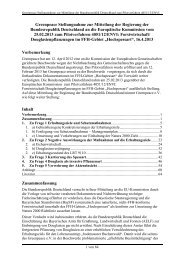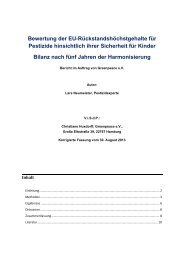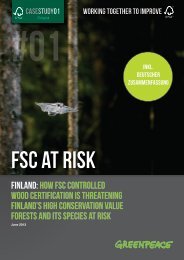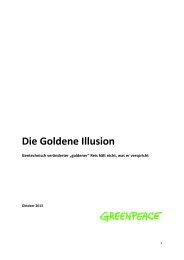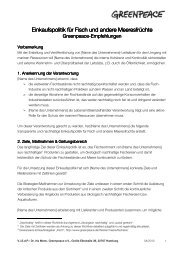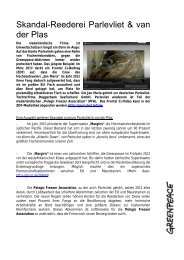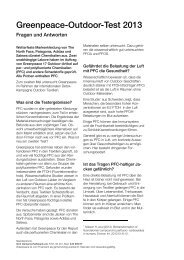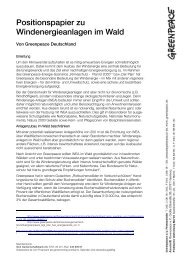Consuming Canada's Boreal Forest: The chain of ... - Greenpeace
Consuming Canada's Boreal Forest: The chain of ... - Greenpeace
Consuming Canada's Boreal Forest: The chain of ... - Greenpeace
You also want an ePaper? Increase the reach of your titles
YUMPU automatically turns print PDFs into web optimized ePapers that Google loves.
Cutting Down the<br />
<strong>Boreal</strong> <strong>Forest</strong><br />
Woodland<br />
Caribou<br />
<strong>Greenpeace</strong><br />
Major products exported from Canada’s forests include s<strong>of</strong>twood lumber, newsprint,<br />
wood pulp, wood panels (plywood, etc.), paper and paperboard. In 2005, the total value<br />
<strong>of</strong> exports was CDN$41.9 billion (US$37.7 billion). Eighty per cent <strong>of</strong> exports went to the<br />
United States, followed by the European Union and Japan as secondary markets. 1 <strong>Forest</strong><br />
products are Canada’s third largest export, both to the United States and Europe. 2, 3<br />
Logging clears over 700 thousand hectares (over 1.5 million acres) in Canada’s <strong>Boreal</strong><br />
<strong>Forest</strong> each year. This includes thousands <strong>of</strong> kilometers <strong>of</strong> roads, which contribute to<br />
ongoing fragmentation <strong>of</strong> and damage to wildlife habitat as well as increased risk <strong>of</strong><br />
forest fires.<br />
Almost all <strong>of</strong> Canada’s <strong>Boreal</strong> <strong>Forest</strong> is publicly owned and managed by provincial<br />
and territorial governments and approximately half <strong>of</strong> the treed <strong>Boreal</strong> <strong>Forest</strong> has already<br />
been allocated or licensed to logging companies. <strong>The</strong> heaviest development is concen-<br />
trated in the southern reaches <strong>of</strong> the forest, which also are the most productive wildlife<br />
habitat. In the areas where logging is occurring, over 90 per cent <strong>of</strong> the forest is being<br />
subjected to ecologically destructive clearcuts, with individual cuts sometimes extending<br />
over 10,000 hectares, or approximately 17,000 football fields. This makes them some <strong>of</strong><br />
the largest clearcuts in the world. A further worry is that logging companies, in a quest<br />
for access to more <strong>of</strong> the <strong>Boreal</strong> <strong>Forest</strong>, are beginning to seek allocations that will push<br />
the cut line ever more northward into the remaining intact areas.<br />
A disappearing forest means increased threats to the survival <strong>of</strong> the wildlife species that inhabit<br />
it. Already, the Labrador marten, wolverine, woodland caribou, eastern wolf and cougar<br />
are listed on endangered species lists in Canada, due to forest loss and fragmentation. 4<br />
While many animal populations suffer from intensified industrial activity and deforestation, some boreal species<br />
are more immediately vulnerable, particularly those that depend on old-growth forest areas. <strong>The</strong> majestic wood-<br />
land caribou, a Canadian iconic animal, emblazoned on the country’s 25-cent-piece, is in many respects a key<br />
indicator species, signalling that all is not well in the <strong>Boreal</strong> <strong>Forest</strong>.<br />
<strong>The</strong> range <strong>of</strong> woodland caribou in northern Ontario for example, has receded dramatically over the past century<br />
through the encroachment <strong>of</strong> human development and increased habitat disturbance and alteration. Across the<br />
<strong>Boreal</strong> <strong>Forest</strong> region in Canada, more than 23 per cent <strong>of</strong> the original caribou habitat has been lost. 5 This has led<br />
many to refer to the plight <strong>of</strong> the caribou as a “slow-motion crisis.” 6 Caribou require very large areas <strong>of</strong> mature,<br />
coniferous forest; industrial logging that creates a fragmented forest landscape has taken a serious toll on caribou<br />
populations. 7 In Ontario, caribou range has receded approximately 34 kilometers (21 miles) per decade in the<br />
past century, and there has been a widespread loss <strong>of</strong> habitat. 8 In fact, so much habitat has been lost in the last<br />
20 years that scientists studying woodland caribou fear that if large tracts <strong>of</strong> intact <strong>Boreal</strong> <strong>Forest</strong> are not protect-<br />
ed, extinction <strong>of</strong> the species in Ontario could happen by the middle <strong>of</strong> this century. 9 <strong>The</strong> situation is similar in<br />
other provinces, such as Quebec.<br />
Woodland caribou in Canada were first considered a “rare” species in 1984, by the federal Committee on the<br />
Status <strong>of</strong> Endangered Wildlife in Canada, and in 1995 their status worsened to “vulnerable.” In 2000, the wood-<br />
land caribou’s status was declared to be “threatened”—likely to face imminent extinction if threatening factors<br />
are not reversed. 10<br />
Caribou researchers and experts suggest that the only way to help protect caribou populations in the <strong>Boreal</strong><br />
<strong>Forest</strong> survive is to protect intact forest where there is critical caribou habitat. <strong>The</strong> refuges needed for woodland<br />
caribou are large, with a median area <strong>of</strong> 9,000 km 2 (3,475 mi 2 ) required for Canadian populations and a<br />
surrounding buffer zone <strong>of</strong> intact forest 13 kilometers (8.1 miles) wide; this is a much larger area than what<br />
is currently set aside as protected areas for caribou in provinces such as Ontario and Quebec. 11<br />
<strong>Consuming</strong> <strong>Canada's</strong> <strong>Boreal</strong> <strong>Forest</strong>: <strong>The</strong> <strong>chain</strong> <strong>of</strong> destruction from logging companies to consumers<br />
19



